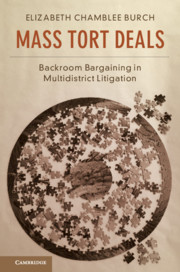Book contents
- Mass Tort Deals
- Mass Tort Deals
- Copyright page
- Dedication
- Contents
- Figures
- Tables
- Acknowledgments
- Introduction
- 1 When Mass Torts Meet Multidistrict Litigation
- 2 Quid Pro Quo Arrangements?
- 3 The Rise of Repeat Players
- 4 Judges as Bulwarks and Nudgers
- 5 When Multidistrict Litigation Settles into “Alternative Dispute Resolution”
- 6 Reforming Multidistrict Litigation
- Conclusion
- Appendix
- Index
5 - When Multidistrict Litigation Settles into “Alternative Dispute Resolution”
Published online by Cambridge University Press: 16 May 2019
- Mass Tort Deals
- Mass Tort Deals
- Copyright page
- Dedication
- Contents
- Figures
- Tables
- Acknowledgments
- Introduction
- 1 When Mass Torts Meet Multidistrict Litigation
- 2 Quid Pro Quo Arrangements?
- 3 The Rise of Repeat Players
- 4 Judges as Bulwarks and Nudgers
- 5 When Multidistrict Litigation Settles into “Alternative Dispute Resolution”
- 6 Reforming Multidistrict Litigation
- Conclusion
- Appendix
- Index
Summary
When plaintiffs “settle,” they actually give up their lawsuit to enter into a settlement program that may or may not compensate them. So, mass-tort “settlements” don’t end disputes – they contractually move them out of the courts and into private resolution, or alternative dispute resolution (ADR) as it’s known. For instance, in American Medical Systems, all disputes over pelvic-mesh payouts went directly to JAMS, a for-profit arbitration company. And in the Conserve Hip Implant proceeding against Wright Medical, the court appointed a special master from JAMS to preside over the private settlement, used its “inherent authority” to give that special master the final say over any settlement appeal, and prohibited judicial review of those appeals. These private dispute resolution programs allow mass-tort defendants to regain some of the bargaining advantages they enjoy in the consumer context: they can pick the arbitrator, dictate the procedures used, and select which evidence the arbitrator may consider. Plaintiffs, however, don’t know whether they’ll recover anything. Claims administrators may tilt justice in favor of the repeat players who pick them, confidential awards make it hard for plaintiffs to tell if they’re treated fairly vis-à-vis one another, and internal “appeals” processes offer little relief.
Keywords
- Type
- Chapter
- Information
- Mass Tort DealsBackroom Bargaining in Multidistrict Litigation, pp. 134 - 167Publisher: Cambridge University PressPrint publication year: 2019



